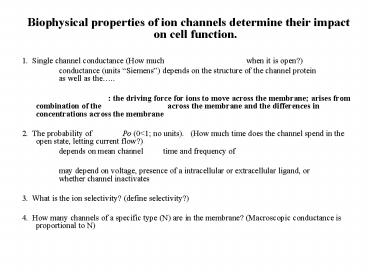Biophysical properties of ion channels determine their impact on cell function'
1 / 39
Title:
Biophysical properties of ion channels determine their impact on cell function'
Description:
Biophysical properties of ion channels determine their impact on cell function. ... Electrical synapse at crayfish giant motor synapse. ... –
Number of Views:70
Avg rating:3.0/5.0
Title: Biophysical properties of ion channels determine their impact on cell function'
1
- Biophysical properties of ion channels determine
their impact on cell function. - 1. Single channel conductance (How much current
flows through it when it is open?) - conductance (units Siemens) depends on the
structure of the channel protein as well as
the.. - electrochemical gradient the driving force for
ions to move across the membrane arises from
combination of the voltage difference across the
membrane and the differences in ion
concentrations across the membrane - 2. The probability of opening Po (0lt1 no
units). (How much time does the channel spend
in the open state, letting current flow?) - depends on mean channel open time and frequency
of channel openings - may depend on voltage, presence of a
intracellular or extracellular ligand, or
whether channel inactivates - 3. What is the ion selectivity? (define
selectivity?) - 4. How many channels of a specific type (N) are
in the membrane? (Macroscopic conductance is
proportional to N)
2
(No Transcript)
3
The sign of the synaptic potential (excitatory or
inhibitory) will be determined by the value of
the reversal potential of the synaptic current
relative to the resting potential. If Erev is
positive to the resting potential, activation of
the ionotrophic receptor will lead to
depolarization. (examples glutamate and Ach
receptors) If Erev is negative to the resting
potential, activation of the ionotrophic receptor
will lead to hyperpolarization. (examples GABA
receptors, glycine receptors) The synaptic
current (Isyn) will be equal to the single
channel conductance times the driving force. Isyn
?syn (Vm-Erev)
4
REVIEW
5
(No Transcript)
6
The size and shape of the postsynaptic potential
is proportional to that in the presynaptic cell.
7
Gap Junction Structure
8
Complexities in gap junction structure.
Evans Martin 2002
9
(A) Two dendrites (labeled D) in the Inferior
olivary nucleus of the cat are joined by a gap
junction (arrow). The usual space between the
cells is almost obliterated in the contact area
which is traversed by cross bridges. From
Sotelo, Llinas and Baker 1974
10
Different connexins have different voltage
sensitivity.
Channel open
Cx43
Cx46
Channel closed
11
Non-rectification.
Rectification.
I
I
conductance
conductance
V
V
12
Aplysia inking response.
13
Electrical synapse at crayfish giant motor
synapse.
14
Postsynaptic response is greatly potentiated if 2
inputs occur within 0.1 msecs of each other.
15
(No Transcript)
16
Presynaptic
Postsynaptic
Postsynaptic Cell
Presynaptic Cell
17
(No Transcript)
18
(No Transcript)
19
(No Transcript)
20
(No Transcript)
21
(No Transcript)
22
(No Transcript)
23
(No Transcript)
24
(No Transcript)
25
(No Transcript)
26
(No Transcript)
27
(No Transcript)
28
(No Transcript)
29
Calcium Waves in Retinal Glial Cells Science
275844-846 (1997) Eric A. Newman and Kathleen
R. Zahs
Calcium-green labelled astrocytes (1,3,5) and
Muller cells (2,4,6). Dotted line is mechanical
stimulus. Yellow indicates leading edge of Ca
wave. Symbols indicate rate of waves stimulated
by ATP (triangles), mechanical (circles) and
electrical (sq) stimuli.
30
Calcium Waves in Retinal Glial Cells Science
275844-846 (1997) Eric A. Newman and Kathleen
R. Zahs
The propagation of calcium waves through a glial
syncytium represents an extraneuronal signaling
pathway that may influence neuronal activity. The
absence of membrane potential changes suggests
that Ca waves do not lead to the voltage
activation of ion channels in glial cells, which
have been postulated to influence potassium
buffering and neurotransmitter uptake. But an
increase in Ca i within glial cells could lead
to the release of neuroactive substances and to
the modulation of neuronal activity.
31
Evans Martin 2002
Spread of calcium through gap junctions
(white/red spots) after cell in center is
mechanically stimulated.
32
(No Transcript)
33
(No Transcript)
34
(No Transcript)
35
Mutations in Cx32 linked to CMT disease.
Frame shift severe
no expression
_at_
_at_
Arg22 stop severe
_at_ hemijunctional conductance
almost normal junctional conductance
36
Within 72 hours, gap junctions expressed
Within 12 hours hemichannels expressed
missense
37
(No Transcript)
38
Balice-Gordon and Scherer Journal of Cell
Biology. 142(4)1095-104, 1998
39
(No Transcript)































